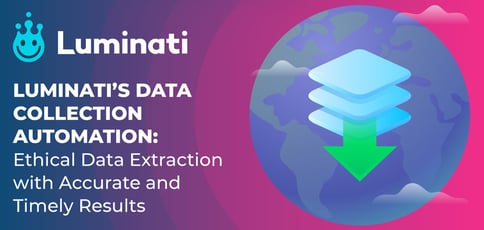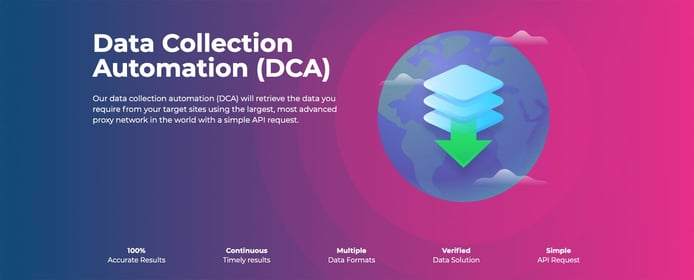
TL; DR: Luminati, already known for helping businesses extract publicly available web data at scale, is taking its service one step further with data collection automation. Now, the company will not only provide access to data through a P2P network of idle devices but also help extract and purify it. Ultimately, Luminati’s goal is to eliminate both compliance and operational concerns, ensuring businesses can leverage the power of data in an efficient and ethical manner.
In a digital economy, data is often referred to as the new oil — but that doesn’t mean it should be just as difficult to extract.
To leverage the benefits of a data-driven approach, businesses must first invest significant time and money collecting information. Only then can they glean insights from the valuable modern resource.
“Think about it this way: It’s like if every gas station in the world had to extract and refine its own oil,” said Or Lenchner, CEO of Luminati.

Luminati now helps customers access, extract, and purify data.
Since 2014, Luminati has provided an advanced proxy network that empowers customers to access data efficiently and without detection.
Now, with its data collection automation (DCA) service — designed for the travel and ecommerce industries and beyond — the company is also helping businesses extract and purify that data, ensuring it’s ready for use in driving innovation, efficiency, and revenue.
This is exceptionally helpful in providing the critical insights needed to plan ahead in a dynamically changing ecommerce scene. With just a simple API request, Luminati can provide continuous, accurate results in multiple formats.
Businesses can use the company’s proxy and data scraping solution for multiple purposes, including competitive intelligence, brand protection, SEO monitoring, market research, and website testing. And, because Luminati operates from an ethics-first standpoint, users can feel confident that they are in compliance with the latest standards on proxy use and data collection.
Ultimately, the company’s goal is to eliminate both compliance and operational concerns, ensuring businesses can leverage the power of data in an efficient and sustainable manner.
Helping Businesses Access and Extract Publicly Available Data
With the addition of DCA, Or said that Luminati provides the three essential pillars of managing publicly available data: infrastructure, powerful unblocking software, and automated data retrieval.
“By providing the most advanced distributed proxy network as an engine, Luminati has always been focused on making data collection, faster, efficient, and more effective,” he said. “Now, we’re heading in the direction of automating the entire operation for our customers.”
Infrastructure-wise, the company’s peer-to-peer network uses the residential IP addresses of millions of idle devices to access data, providing a win-win situation for device owners and businesses.

Data collection automation (DCA) serves as the final piece in Luminati’s layered approach.
Those who consent to contribute their IP addresses in exchange receive compensation in various forms, such as ad-free or no-cost applications from a partner developer. Resources are only used when the device is connected to wifi, not in use, and has sufficient battery power.
And businesses benefit from the ability to gather info from public sites that block data or display misleading information when too many requests are sent from the same IP.
A few months ago, Luminati introduced another layer to its approach for managing publicly available data: Unblocker. The software ensures that users can send just one request to target sites and receive the most accurate data available — all while operating ethically.
“We make sure that the request is passed through, and you get a response,” Or said. “At this stage, we’re still not handling the data collection itself, but helping you access that data. At the same time, we’re not damaging the target domain or slowing it down.”
The third pillar — data collection automation — is the extraction process, which Or said involves robotic process automation (RPA). “It’s taking manual labor and automating it to increase efficiency,” he said.
Trading Inefficient Manual Labor for Automation and QA
The benefits of Luminati’s DCA platform are threefold: saving users money and time through automation and labor reduction, providing highly accurate data, and empowering organizations with the ability to operate with agility.
A select group of Luminati customers is currently beta testing the platform, which allows them to specify their needs via a discovery API and receive results in a variety of formats. “You can easily use the API to communicate your requirements, including when do you need the data and how often,” Or said.
For example, if a retailer wanted to collect information on clothing pricing, he could schedule requests through the DCA API. Luminati would then handle the discovery process internally before extracting all relevant, publicly available data.

A simple API provides timely, accurate results in multiple data formats.
Before sending information to the customer, Luminati goes to great lengths to ensure data is validated and passes quality assurance standards. This step protects customers from what is known as spoof data — information that companies purposely put out to shield information from extraction, even though that information is publicly available and thus, fair game.
Or said this is possible because of Luminati’s extensive experience in the field. “We overview so many data extraction operations that we know pretty much everything, because we see these operations in the thousands, while our customers only see their own operations,” he said.
At the end of the day, customers receive vetted, high-quality data in their desired format without investing large-scale resources.
“After we finish extracting the data, we are able to supply the results to the customer in format, whether it’s directly to an Amazon S3 server or delivered as a CSV over email,” Or said.
Eliminating Both Compliance and Operational Concerns
So far, customers have been quite pleased with the results. Or told us data extraction is a necessity for many companies, allowing them to research trends and fight online fraud, but that doesn’t mean anyone enjoys it.
“Our customers love not having to be responsible for the data extraction process itself,” he said. “By building this product, we allow them to focus on deriving insights from the data.”
And, because of Luminati’s commitment to ethics, users don’t have to worry about being in compliance with the latest standards on proxy use and data collection.
Other than the device’s IP address, the Luminati SDK, which powers the company’s infrastructure, does not access or use any personal information. Or said resources are never used for purposes such as crypto mining or storage, and the company’s services are fully compliant with data protection laws, such as the GDPR.
In addition, Luminati monitors usage via both automated and manual systems to ensure the network is abuse-free. And, before using the network, every potential customer is subjected to a rigorous compliance procedure.
Ultimately, the company takes pride in taking care of both operational hassles and compliance concerns, lifting a huge burden off its customers.
“Everyone talks about the power of data, but no one really talks about the collection process,” Or said. “We’ve been enabling this market for five years, helping the biggest companies in the world find success. And we’re thrilled with that.”
HostingAdvice.com is a free online resource that offers valuable content and comparison services to users. To keep this resource 100% free, we receive compensation from many of the offers listed on the site. Along with key review factors, this compensation may impact how and where products appear across the site (including, for example, the order in which they appear). HostingAdvice.com does not include the entire universe of available offers. Editorial opinions expressed on the site are strictly our own and are not provided, endorsed, or approved by advertisers.
Our site is committed to publishing independent, accurate content guided by strict editorial guidelines. Before articles and reviews are published on our site, they undergo a thorough review process performed by a team of independent editors and subject-matter experts to ensure the content’s accuracy, timeliness, and impartiality. Our editorial team is separate and independent of our site’s advertisers, and the opinions they express on our site are their own. To read more about our team members and their editorial backgrounds, please visit our site’s About page.

